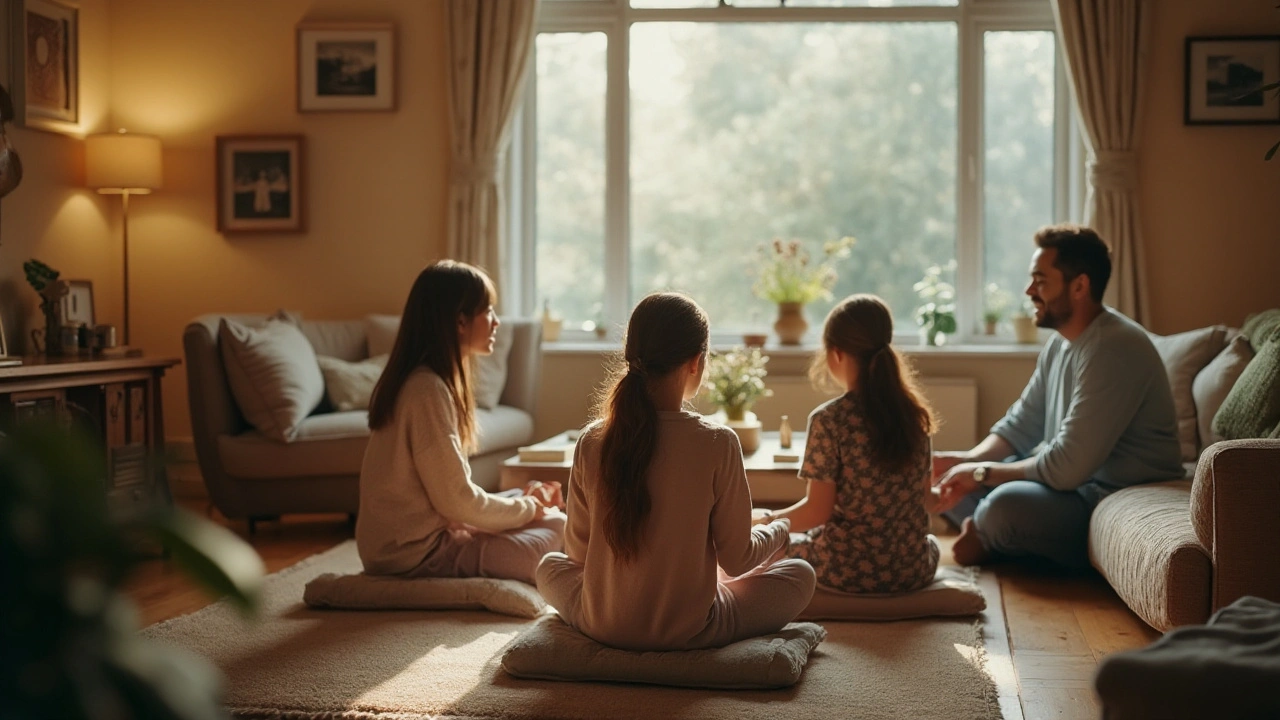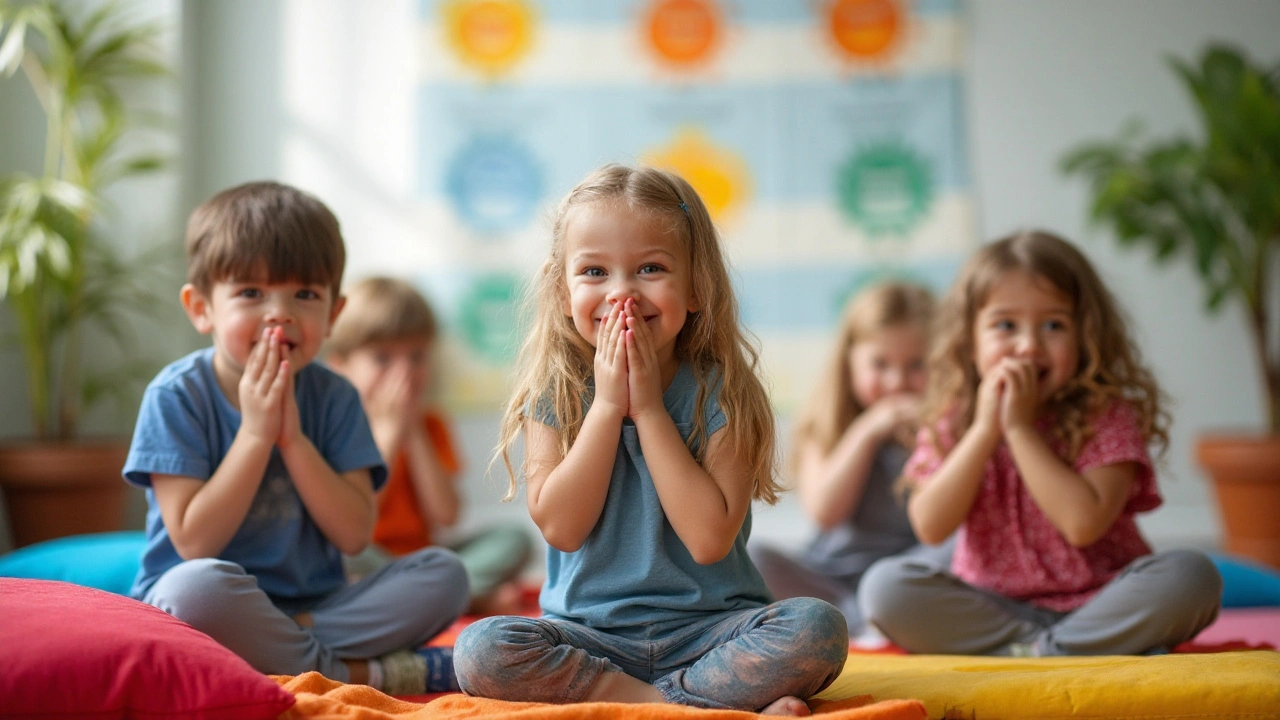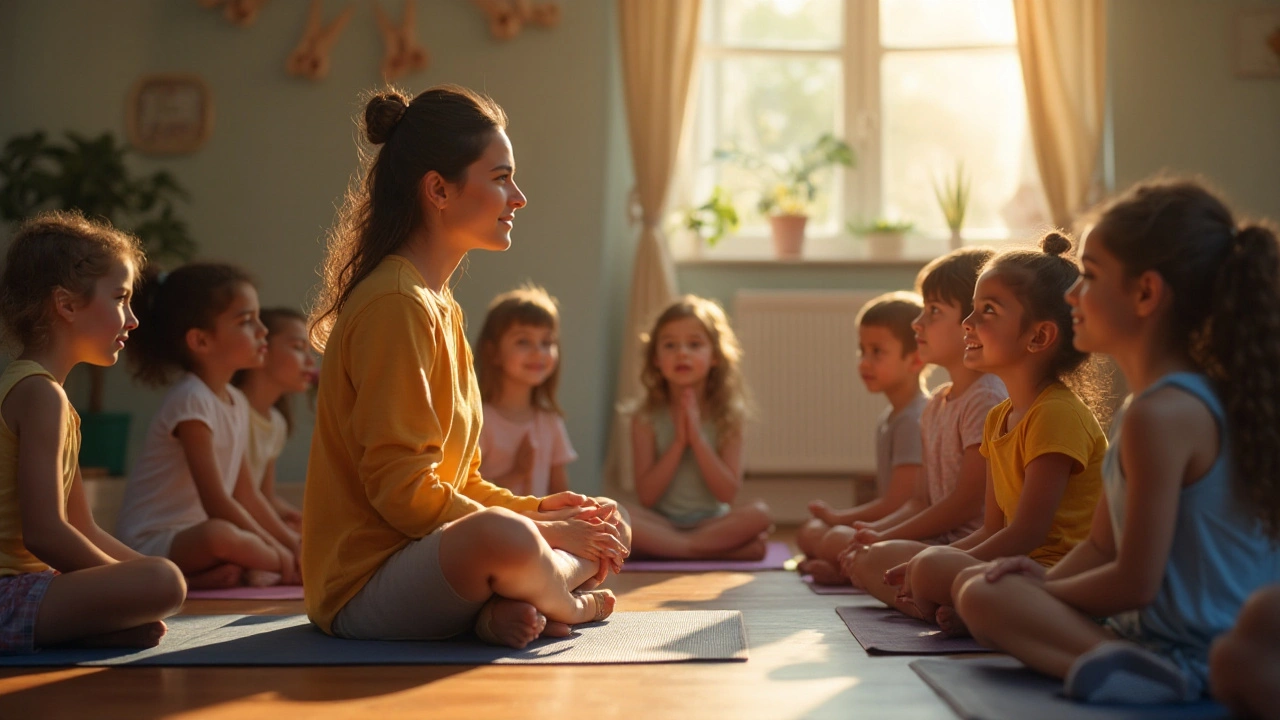Meditation isn't just for adults looking to unwind. Kids can benefit immensely from it, too! Introducing meditation to children can help them manage their emotions, enhance focus, and even improve overall well-being. Since kids are full of curiosity and energy, meditation can be an excellent tool to harness these qualities positively.
Why should kids meditate? Studies show that meditation can help children reduce anxiety, improve attention span, and even sleep better. It's not just about sitting still in silence. Think of it as a gym for the mind where kids can learn to exercise their mental muscles, making them stronger and more resilient.
But how do you get children to meditate? Start them young with fun and engaging techniques. Simple breathing exercises, like pretending to blow up a balloon, can be a great start. Guided visualizations, where kids picture themselves in a peaceful place, can also make meditation more appealing.
Not to mention, the benefits of meditation for children extend beyond calm moments. Regular mindfulness practice can lead to better academic performance, improved social skills, and a more balanced emotional state. It's like giving kids a magic wand to help them navigate life's ups and downs.
Consistency is key. Establishing a daily meditation routine can create a sense of structure and help children see meditation as a natural and enjoyable part of their day. Whether it's before bed or even first thing in the morning, a regular practice can set the stage for a lifetime of mental wellness.
- Why Kids Should Meditate
- Simple Meditation Techniques for Kids
- Benefits of Meditation for Children
- Creating a Meditation Routine
Why Kids Should Meditate
In today's fast-paced world, children face various challenges that can affect their mental and emotional health. From academic pressures to social dynamics, young minds are constantly navigating a myriad of stressors. Meditation for kids offers an effective solution. By introducing meditation at an early age, we equip children with tools to manage stress and anxiety. Research shows that children who meditate regularly exhibit improved attention spans and emotional regulation. They tend to sleep better, which also positively impacts their overall well-being.
Teaching kids to meditate can help them develop a sense of calm and stability. Meditation helps in promoting self-awareness, which is crucial for emotional intelligence and mental health. When kids learn to meditate, they're better able to understand and manage their emotions, leading to healthier relationships and improved social skills. In essence, meditation provides a mental space where kids can step back, reflect, and respond to situations with a clearer mind.
According to Dr. Jon Kabat-Zinn, a pioneer in mindfulness-based stress reduction, "Meditation helps kids become more aware of their thoughts and feelings in a non-judgmental way, fostering a profound sense of inner peace and emotional stability."
It's not just about mental well-being. Physical health benefits are also significant. Studies suggest that regular mindfulness practice can improve immune function and reduce the risk of chronic illnesses. Children who engage in meditation can experience lower levels of cortisol, the stress hormone, which in turn fosters better physical health. Mindfulness techniques taught early in life can also aid in the development of healthy coping mechanisms for future challenges.
Another compelling reason for kids to meditate is the enhancement of academic performance. Schools that have incorporated mindfulness programs report noticeable improvements in students' focus and concentration. When children can focus better, their ability to learn and retain information naturally increases. This cognitive benefit is invaluable in today's educational environment, where attention spans are often fragmented by technology and distractions.
Moreover, meditation is an inclusive practice that respects and embraces diverse backgrounds and beliefs. It's a skill that can be adapted to suit any child's needs, making it a versatile and accessible tool for mental wellness. Parents and educators can easily incorporate short mindfulness exercises into daily routines, creating a supportive environment for children to thrive.
Long-Term Benefits
The advantages of starting meditation at a young age extend well into adulthood. Children who meditate are likely to carry these habits into their later years, maintaining mental resilience and emotional balance throughout life. This foundation of mindfulness can lead to healthier lifestyles and better decision-making skills. It's an investment in a child's future, cultivating a mindset that values health, well-being, and inner peace.
As we continue to recognize the importance of mental health in holistic development, incorporating meditation for kids becomes more than just an optional activity—it becomes essential. By nurturing mindfulness in children, we help shape a generation that is well-equipped to handle the complexities of modern life with grace and confidence.

Simple Meditation Techniques for Kids
When it comes to getting kids started on meditation, simplicity and fun are the key elements. Children have a shorter attention span, which means the activities should be engaging and easy to follow. One great technique is the breathing exercise, where kids can pretend they are blowing up a balloon. Ask them to take a deep breath in through their nose, and then slowly exhale through their mouth, imagining the balloon expanding. This activity not only makes it fun but also helps them learn how to control their breath, a fundamental part of meditation.
Another effective method involves using guided visualizations. Kids love stories, so why not turn a meditation session into one? Suggest they close their eyes and imagine themselves in a magical forest or floating on a cloud. Paint a vivid picture for them and encourage them to explore this imaginary space. This practice helps improve focus and nurtures their creativity, taking them to a state of calm without them even realizing they're meditating.
It's also beneficial to incorporate physical activities with meditation. For example, yoga for kids can combine physical movement with mindfulness. Poses like the tree or cat-cow can be fun and easy for children to do. As they hold each pose, remind them to breathe deeply and stay present. This combination helps in releasing pent-up energy while guiding them towards a peaceful state.
Encouraging kids to use affirmations can also be a powerful tool in meditation. Teach them simple, positive statements they can repeat to themselves like, "I am calm," or "I am strong." These affirmations can be said quietly during meditation or written down and placed somewhere they can see daily. Such practices not only promote positive thinking but also enhance their self-esteem and mental resilience.
Technology can lend a helping hand too. There are plenty of meditation apps designed specifically for children. Apps like

Benefits of Meditation for Children
Meditation offers a treasure trove of benefits that can significantly impact children's lives. One of the most notable advantages is the reduction of anxiety and stress. Imagine the relief a child feels when they learn to tackle worries on their own. Studies have shown that mindfulness and meditation can decrease symptoms of anxiety in children, leading to a calmer and more relaxed state.
Enhanced concentration is another key benefit. In today's fast-paced world, kids are bombarded with distractions, from screens to school workloads. Meditation can help improve their focus, enabling them to concentrate better on their studies and other tasks. This improvement in attention span can lead to better academic performance, giving them a head start in their educational journey.
Improved emotional regulation is also at the forefront of advantages. Children aren't just dealing with academic pressures but also social and emotional challenges. Meditation provides a tool for them to understand and manage their emotions effectively. By practicing mindfulness, kids can become more aware of their feelings and reactions, helping them navigate complex social interactions.
Another outstanding benefit is better sleep. Quality rest is crucial for growing children, and meditation can enhance sleep patterns. A simple five-minute meditation routine before bed can make it easier for kids to fall asleep and stay asleep. Better sleep means they wake up refreshed and ready to take on the day.
Physical health also gets a boost. Meditation is often associated with mental well-being, but it also has physical benefits. Studies have indicated that mindfulness practices can lower heart rates and reduce cortisol levels (the stress hormone). This can lead to a healthier, happier child.
Meditation also fosters a sense of empathy and understanding. By learning to be present and mindful, children can develop greater compassion for themselves and others. This empathy can translate into better relationships with peers, parents, and teachers. It's a skill that serves them well throughout their lives.
Additionally, meditation offers children a sense of control. In a world where they often have little say, knowing they can influence their state of mind is empowering. This sense of agency can build confidence and resilience, essential traits for navigating life's ups and downs.
According to Dr. Lisa Miller, Professor of Psychology and Education at Columbia University, "Mindfulness can be a way for kids to develop their emotional literacy and resilience, equipping them with tools to handle the pressures of modern life."
Lastly, meditation can make kids more creative. A peaceful mind often leads to increased creativity and problem-solving skills. When children aren’t preoccupied with stress and can focus clearly, their imaginations can flourish. Whether it’s writing, drawing, or coming up with innovative solutions to problems, meditation can spark a child’s creative potential.
In summary, the benefits of meditation for children are vast and varied. From reducing anxiety and improving focus to fostering empathy and boosting creativity, mindfulness practices can significantly enhance a child's overall well-being. Introducing meditation early on can set the stage for a healthy, balanced, and fulfilling life.

Creating a Meditation Routine
Getting kids to meditate regularly might seem like a challenge, but it's all about creating a routine that fits seamlessly into their day. Consistency is key when it comes to meditation. One of the best ways to establish a habit is to link it with another daily activity. For instance, introducing a short meditation session right after brushing teeth in the morning or before bedtime can make it a natural part of their everyday life.
Begin by setting a specific time and place for meditation. A quiet, comfortable spot where distractions are minimal works best. It could be a cozy corner of their bedroom, a spot in the garden, or even a dedicated meditation nook. Consistency in time and place helps create a sense of ritual, making it something children can look forward to.
Start with short sessions to keep it manageable. Aim for about five minutes initially and gradually increase the duration as kids get more comfortable. Children have shorter attention spans, so expecting them to meditate for long stretches right off the bat might lead to frustration. Think of meditation as a skill they're building over time, much like learning to ride a bike.
Using a timer can be helpful, especially for younger kids. There are various apps available that offer guided meditations specifically designed for children. These can be a great way to introduce kids to meditation, offering engaging stories, calming music, and step-by-step instructions. Find what resonates best with your child and tweak the routine accordingly.
Incorporate different types of meditation to keep things interesting. Guided visualizations, breathing exercises, and body scans can all be part of the rotation. For instance, one day might focus on imagining floating on a cloud, while another could involve breathing like a dragon, with slow, deep breaths. This variety keeps things fresh and enjoyable.
Engagement is essential. Make sure to invite kids to share their thoughts and feelings about the practice. Ask them what they enjoyed and what they found challenging. This open dialogue helps kids feel heard and involved, making them more likely to stick with it. If they associate meditation with positive feelings and experiences, they'll be more inclined to embrace it as a lifelong habit.
Another great idea is to lead by example. Children often mimic the behaviors of adults, so let them see you engage in your own meditation practice. It can be a family activity, where everyone spends a few minutes unwinding together. This not only models the behavior but also strengthens family bonds through shared calm moments.
According to a study by the American Psychological Association, children who meditate regularly experience significantly lower levels of stress and anxiety, better emotional control, and improved academic performance.
Don’t forget to celebrate small wins. If your child meditates for a week without missing a day, acknowledge their effort. Positive reinforcement can go a long way in maintaining motivation. Simple rewards like a special treat or extra playtime can make a big difference.
Ultimately, the goal is to make meditation enjoyable and something children look forward to, rather than seeing it as a chore. By creating a supportive and flexible routine, you're setting the stage for meditation to become a natural and beneficial part of their daily life. Encourage, engage, and most importantly, have fun with it.





